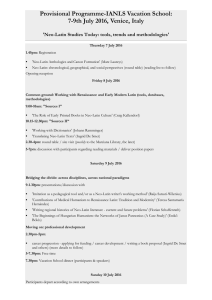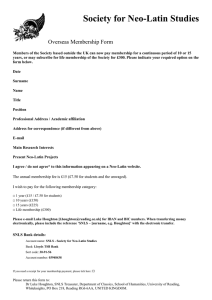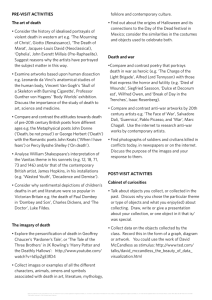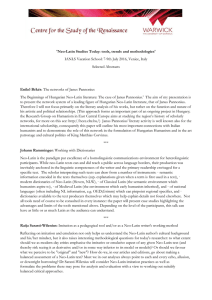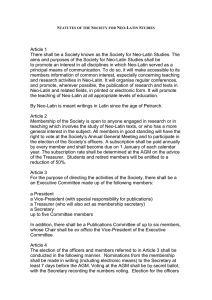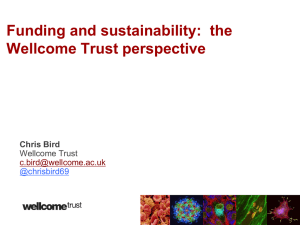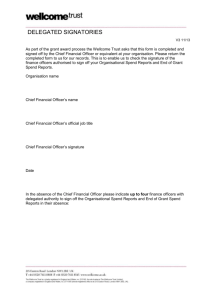Society for Neo-Latin Studies / Wellcome Library
advertisement
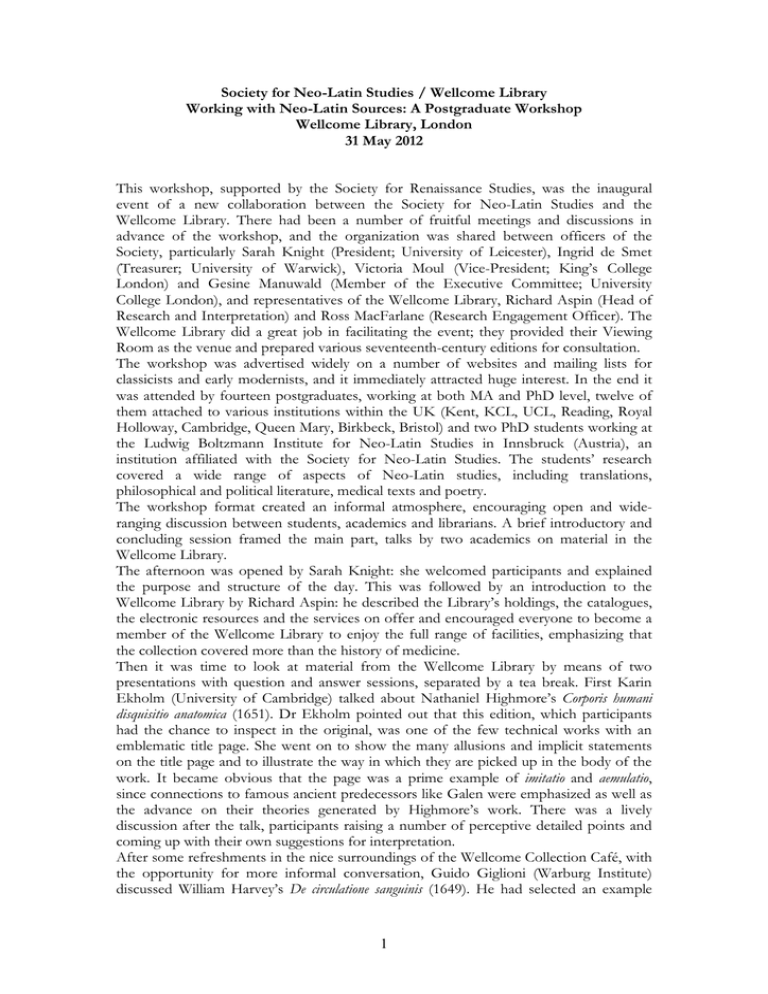
Society for Neo-Latin Studies / Wellcome Library Working with Neo-Latin Sources: A Postgraduate Workshop Wellcome Library, London 31 May 2012 This workshop, supported by the Society for Renaissance Studies, was the inaugural event of a new collaboration between the Society for Neo-Latin Studies and the Wellcome Library. There had been a number of fruitful meetings and discussions in advance of the workshop, and the organization was shared between officers of the Society, particularly Sarah Knight (President; University of Leicester), Ingrid de Smet (Treasurer; University of Warwick), Victoria Moul (Vice-President; King’s College London) and Gesine Manuwald (Member of the Executive Committee; University College London), and representatives of the Wellcome Library, Richard Aspin (Head of Research and Interpretation) and Ross MacFarlane (Research Engagement Officer). The Wellcome Library did a great job in facilitating the event; they provided their Viewing Room as the venue and prepared various seventeenth-century editions for consultation. The workshop was advertised widely on a number of websites and mailing lists for classicists and early modernists, and it immediately attracted huge interest. In the end it was attended by fourteen postgraduates, working at both MA and PhD level, twelve of them attached to various institutions within the UK (Kent, KCL, UCL, Reading, Royal Holloway, Cambridge, Queen Mary, Birkbeck, Bristol) and two PhD students working at the Ludwig Boltzmann Institute for Neo-Latin Studies in Innsbruck (Austria), an institution affiliated with the Society for Neo-Latin Studies. The students’ research covered a wide range of aspects of Neo-Latin studies, including translations, philosophical and political literature, medical texts and poetry. The workshop format created an informal atmosphere, encouraging open and wideranging discussion between students, academics and librarians. A brief introductory and concluding session framed the main part, talks by two academics on material in the Wellcome Library. The afternoon was opened by Sarah Knight: she welcomed participants and explained the purpose and structure of the day. This was followed by an introduction to the Wellcome Library by Richard Aspin: he described the Library’s holdings, the catalogues, the electronic resources and the services on offer and encouraged everyone to become a member of the Wellcome Library to enjoy the full range of facilities, emphasizing that the collection covered more than the history of medicine. Then it was time to look at material from the Wellcome Library by means of two presentations with question and answer sessions, separated by a tea break. First Karin Ekholm (University of Cambridge) talked about Nathaniel Highmore’s Corporis humani disquisitio anatomica (1651). Dr Ekholm pointed out that this edition, which participants had the chance to inspect in the original, was one of the few technical works with an emblematic title page. She went on to show the many allusions and implicit statements on the title page and to illustrate the way in which they are picked up in the body of the work. It became obvious that the page was a prime example of imitatio and aemulatio, since connections to famous ancient predecessors like Galen were emphasized as well as the advance on their theories generated by Highmore’s work. There was a lively discussion after the talk, participants raising a number of perceptive detailed points and coming up with their own suggestions for interpretation. After some refreshments in the nice surroundings of the Wellcome Collection Café, with the opportunity for more informal conversation, Guido Giglioni (Warburg Institute) discussed William Harvey’s De circulatione sanguinis (1649). He had selected an example 1 where the various printed editions of the work, also available for inspection by participants, had different textual variants for the same passage (with or without negation). Dr Giglioni considered the publication history, the difficulties a modern editor or translator of the text faces and possible ways of discovering what Harvey might have originally written. Again this was an interactive session with participants responding to the problems posed and offering possible solutions. The two talks complemented each other well in that they both showcased areas in which the holdings of the Wellcome Library are especially strong and presented two writers, Highmore and Harvey, who worked broadly within the same intellectual tradition. At the same time the talks addressed very different methodological issues and demonstrated that, in order to work on Neo-Latin texts with a scientific focus, one does not need to be an expert in medicine, but rather to be familiar with the principles of interpreting literary texts and works of art as well as the techniques of palaeography and textual criticism. The afternoon was concluded with a short summary, suggestions for further developments and some more browsing of the books on display. Feedback from postgraduates so far has been very positive. Students particularly enjoyed the opportunity to meet fellow researchers in the area of Neo-Latin and the chance to discuss general problems of method and approach. The Society for Neo-Latin Studies intends to build on this event and to hold further postgraduate workshops in future; students have already suggested some interesting topics. The organizers agree that it was a successful event, and further ways to extend the collaboration between the Society for Neo-Latin Studies and the Wellcome Library will be explored. GESINE MANUWALD, UNIVERSITY COLLEGE LONDON 2
